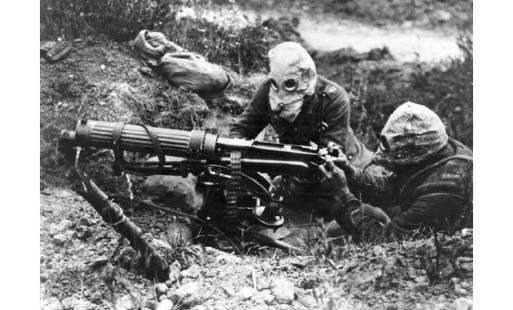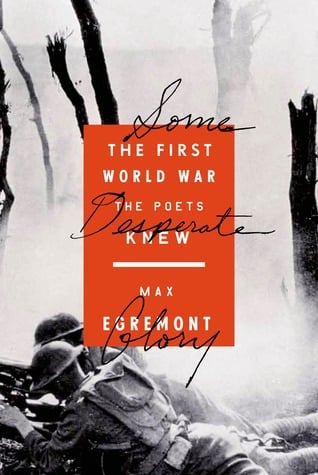In 1985, in the wake of the 70th anniversary of the outbreak of the Great War, a plaque went up in Westminster Abbey’s Poets’ Corner, commemorating Richard Aldington, Laurence Binyon, Edmund Blunden, Rupert Brooke, Wilfrid Gibson, Robert Graves, Julian Grenfell, Ivor Gurney, David Jones, Robert Nichols, Wilfred Owen, Herbert Read, Isaac Rosenberg, Siegfried Sassoon, Charles Sorley, and Edward Thomas. Five—Grenfell, Thomas, Rosenberg, Owen, and Sorley—died on the battlefield, Brooke died of an infected mosquito bite in the Aegean Sea, and Graves died in his own bed at the age of 90. But canonization is canonization. Eleven of the 16 “war poets” commemorated in the Abbey, Max Egremont, author of an acclaimed biography of Sassoon, has chosen to follow through the trenches.
The Muse in arms, to borrow the title of an early anthology devoted to the genre of “war poetry,” is intractable. No verse of any considerable stature has come out of World War II, for instance—not here, not in Britain, not in Germany, not in Russia, not anywhere. I say this with sadness, because my uncle, Evgeny Vinokurov, who, when not yet 18, commanded an infantry platoon, was, as a poet, much nearer the sensibility we recognize in the English “war poets” than any literary Briton or American of a subsequent generation, yet regarded wholesale exploitation of the war theme with distaste.
The same question—why the second war, unlike the first, produced no poetry worth mentioning—was famously raised by T.S. Eliot in 1942, echoing some still earlier ponderings by Robert Graves. This strange dearth was especially noticeable to those who believed in the existence of a moral link between the viscerally felt cause and its poetic anatomizations: After all, come 1941, just about everyone except Hitler agreed that Germany must be defeated at all costs, whereas no such universal agreement had prevailed a generation earlier. In 1914 as in 1939, Germany had been the aggressor, but Kaiser Wilhelm was no Hitler.
Here Eliot’s famous, though not very poetic, words about “private experience at its greatest intensity / becoming universal, which we call ‘poetry’” are apposite. They call to mind Kierkegaard’s obsessive image of the drowning man as the only kind of man whose thoughts have value. Surely, the private experiences of soldiers who had witnessed a Stalingrad or an Auschwitz were no less firmly slated for universality than the experiences of their fathers who fell at Ypres and Somme? And yet the strange dearth was there.
The answer, methinks, lies in the centripetal force of the 20th century, an ever-accelerating tendency to cultural fragmentation—that is to say, barbarization. Comparing the incandescent genius of wartime “Prufrock” with the postwar Waste Land, a distance of merely five years, one can measure the effect of the world-fragmenting centrifuge on Eliot, and much the same effect may be observed in contrasting Joyce’s pre-war collection of poems, Chamber Music, as sublime as it is pellucid, with the self-conscious obscurantism of his later fictions. Outside the sphere of Anglo-American culture, similar cases can be made for Pasternak or Rilke in the realm of poetry, for instance, or for Sholokhov and Thomas Mann in prose. It is as though all these various and disparate Beethovens, instead of moving inward, toward the late quartets, were moving outward, toward bombast, politics, and Wellington’s Victory.
In other words, British “war poets” existed during the Great War because they had been subsisting, like bacteria in a petri dish, upon a vanishing Anglo-American culture that yet valued pure poetry above academic obscurantism, on the one hand, and vulgar sensationalism, on the other—both characteristics, increasingly and apparently inexorably, of the new culture then emerging the world over. These “war poets” were the poets—some more talented, like Julian Grenfell, some less, like Robert Graves, but all with a commonality, as it were, of poetic confession among them—who happened to have been called up, that’s all. A generation later, there were no such creatures left, and therefore it isn’t really all that surprising that none was in evidence when World War II came round.
Thus the conception consequent to this view of the epoch, which I had rather been expecting Max Egremont’s book to deconstruct, is that the “war poets” were merely a wartime manifestation of the “Georgians,” the group of poets harbored and nurtured under the auspices of Harold Monro’s Poetry Bookshop in London before, during, and briefly after the war by a sensitive and sensible editor and cultural impresario by the name of Edward Marsh. Needless to say, I am not the author of this conception. It was first aired some 50 years ago, in a work of literary history by Robert Ross entitled The Georgian Revolt: Rise and Fall of a Poetic Ideal, 1910-1922.
Marsh collected and published five biannual anthologies of Georgian Poetry between 1912 and 1922. Even a cursory flip through Egremont’s book will alert the reader to the man’s pervasive influence over the lives and careers of its 11 subjects; he coaxes poems from one, gets a regimental commission for another, loans money to a third, playing a kind of Diaghilev to the Ballets Russes of British verse. A homosexual and something of a bon viveur by night, in his other career—that of a civil servant—Marsh served as private secretary to some of Britain’s most powerful ministers, including Winston Churchill, his professional experience and exalted connections allowing him to act as the guardian angel and a puller of strings for the who’s who in poetry of his day. It was under Marsh’s roof that Siegfried Sassoon and Rupert Brooke first met, it was Marsh who introduced Sassoon to Churchill, and it was Marsh who, after Brooke’s death, became his literary executor.
Marsh is undoubtedly the éminence grise of Egremont’s narrative, a canny old coach in the locker room of his charges, a souffleur in the prompter’s booth of his subject. What of the actual actors, the ones with speaking parts? As it happens, the book is part biography, part anthology, with Egremont inserting chronologically pertinent selections from his 11—the allusion to cricket, with all the gentlemanliness this implies, will not be lost on the author’s compatriots—into a literary history that bobs and weaves through facts of biography like a slalom skier. His editorial choices are thoughtful and representative, so whenever one becomes dizzy from following his biographical pirouetting down the slope, one can always take a break and immerse oneself in the book’s prima materia.
For anyone with an interest in English poetry before the modernist explosion, this is a book to buy. Readers may note that I have not quoted a single line from any of the “war poets” in my review. This is because lines of poetry out of context are very nearly abracadabra, and what this book provides, sensitively and sensibly, is just that: the context. If Sir Edward Marsh, as he became, were peeking from Purgatory, he would be feeling pleased.

[Some Desperate Glory: The First World War the Poets Knew, by Max Egremont (New York: Farrar, Straus and Giroux) 337 pp., $28.00]

Leave a Reply